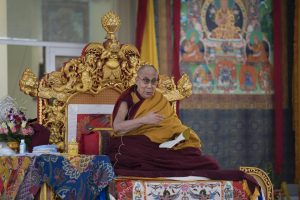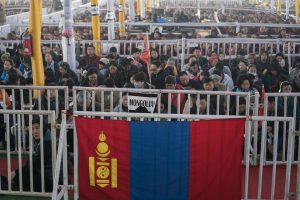
Photo: OHHDL
His Holiness the Dalai Lama’s second three-day teaching this month in Bodh Gaya was Nagarjuna’s Commentary on Bodhicitta and Gyalsey Thokme Sangpo’s Thirty-Seven Practices of a Bodhisattva. Around 30,000 people attended, including 10,000 monks and nuns and 3,300 foreign visitors from 70 different countries. This teaching was organised at the request of Tibetan and Mongolian devotees.
In his introductory remarks, His Holiness spoke about the importance of the right motivation forthe devotees as well as the teacher. “On the part of the Lama, that means not teaching out of any expectation of wealth or fame. Turning the Dharma into a business is very negative” said His Holiness.
Addressing the people from the Himalayan region he said, “We also have here many people from the Himalayan region and there are many monks and nuns from their communities in our monasteries and nunneries. They have made up the numbers since the flow of monks and nuns out of Tibet has declined – something we can be mutually grateful for”. He also extended his welcome and to the devotees from the west and expressed gratitude to them for their interest in the Tibetan culture and religion and for their support.
On the second day of the teaching, His Holiness offered vows for lay people wishing to take them.
Speaking about the vows he explained, “The main practice in relation to these vows is to restrain yourself from extreme self-centredness, to avoid indulging in a self-cherishing attitude”.

Group of people from Mongolia
Photo: OHHDL
On the final day of the teaching he spoke about the relevance of spirituality in the 21st century, saying it is swayed by many scientific and technological developments. “Buddhist philosophical and psychological ideas can be relevant today in helping people transform minds swayed by attachment and anger” said His Holiness.
His Holiness then conferred the Avalokiteshvara empowerment. A Long-Life Offering for His Holiness was then conducted at the behest of Namgyal Monastery and the Mongolian group who were attending the teaching.
“Today in the contemporary world, there is so much talk about feminism. This lineage of the practice […] has come down from Bhikshuni Palmo, a female Buddhist practitioner,” said His Holiness while conferring the empowerment .
Gelongma Palmo or Bhikshuni Palmo is the founder of the Nyungne* lineage; she lived during the tenth or eleventh century.
His Holiness will continue taking part in the events scheduled at Bodh Gaya from January 18 -21.
*Retreat or fasting, keeping all the vows




 Print
Print Email
Email